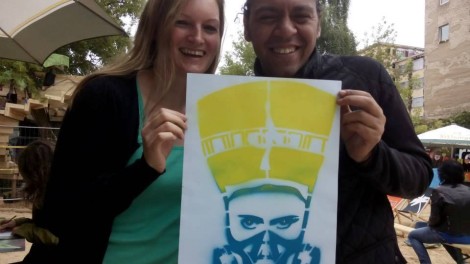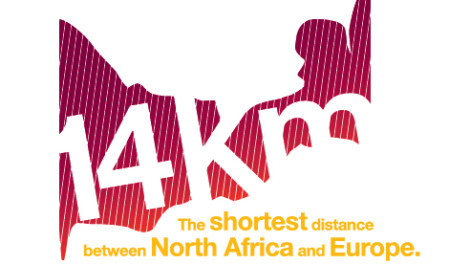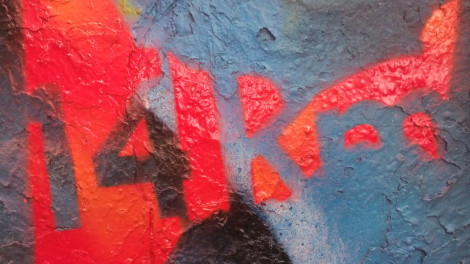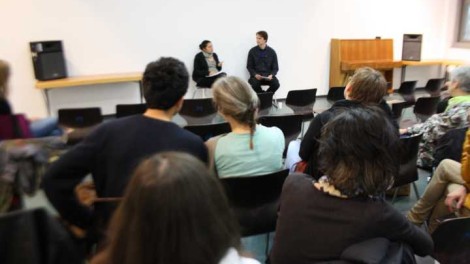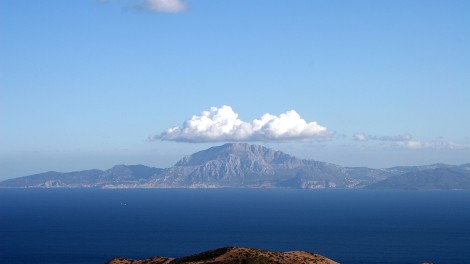Author Archives: wp_admin
On an exchange visit to 14km – Ahmed Hassen from el Takeiba Center (Cairo)
From mid June to mid July 2014, Ahmed Hassen, the founder of El Takeiba Center for Artistic and Cultural Development in Cairo, Egypt, is visiting 14km in Berlin to work together on different projects and to share experiences - an exchange visit funded by the DAWRAK exchange programme of the Anna Lindh Foundation. The first cooperation between Ahmed and 14km consisted in a street art workshop for young people, teaching and discussing graffiti and its use as a tool of protesting, and giving a general background about the art of public wall painting and linking it to German history. Ahmed had a great time, showing a very creative attitude and - despite not speaking the same language - working side by side and in intense interaction with the young participants. El Takeiba Center is the first cultural center located in the poor Cairo area of Shoubra El Kheima. Ahmed, who is the director, intentionally opened it there, wanting to create a space that provides access to arts and culture for the inhabitants of the area who so far have been deprived of it. This is one of the main reasons for why it expanded quickly and is now well-known among the people of the district. The whole idea of founding this center came about due to a man called Rabea who was the guard of a famous art institute in Cairo. He loved poetry so much that someday he tried to get the chance to get into the institute and narrate a poem of his own to the audience. Yet he was banned because he was "just" the guard of the place. This incident had a deep impact on Ahmed, and he decided to help Rabea and everyone interested in art no matter what their social class, profession, education level, political views or even religious views are - everyone should have the chance to express themselves via arts and try out their talents. Ahmed believes in the power of art to change what words and arguments cannot. The El Takeiba Center has various projects and organises workshops for different groups of people according to their age, gender, and interests and covering different topics and different artistic methods, from acting, directing, improvising on stage, singing, comic drawing to caricature painting. The center also organises "cultural visits", where people from Shoubra El Kheima are invited to different cultural events elsewhere in the city. The only problem the center is facing is - as it often happens with small NGOs - the funding for these projects. Thus, Ahmed and his co-workers at El Takeiba invest a lot of their own money and time, yet they believe the difference they get to see in the people of Shoubra El Kheima is worth it, as they change for the better and discover their interest in learning more. Later this year, Anja Gebel from 14km will visit Ahmed in Egypt and work with the El Takeiba Center in Shoubra El Kheima.
On short notice: Internship placement with 14km (Berlin) from 4 August to 30 September 2014
From 4 August, an internship placement is available at the Berlin office of 14km (until minimum 30 September, or longer). It is a part time internship with weekly working hours from Monday to Wednesday, 10am-6pm. The internship is unpaid. The envisioned tasks of the intern consist in: - Supporting the preparation and organisation of one or more international exchange projects - Research and maintenance of international contacts - Setup and maintenance of a new contact database - Supporting PR activities - Creative work on website texts and photos - Supporting the conceptualisation of future projects - The conceptualisation of own project ideas is possible. If you are interested, please send your application, consisting of a short cover letter and your CV, via email to Anja Gebel at info@14km.org. We are looking forward to receive your application until 7 July!
Peace Doves, Flower Throwers und Nefertiti with Gas Mask – a 14km Street Art Workshop
On the last weekend of June 2014 a Street Art Workshop under the title of “Against Exclusion! Transcending walls and building bridges via Street Art” took place in Berlin-Friedrichshain. It was held by 14 km in cooperation with the Egyptian El Takeiba Centre for Artistic and Cultural Development, the youth club Jugendclub Feuerwache and the beach club YAAM (both in Friedrichshain) in an endeavor of showing the young participants ranging from the age of 13 to 17 a modern and artistic way of protesting and commenting on life conditions that they might dislike or be critical of. The workshop has been a complete success as the participants received the content through an active learning methodology and supporting material; our main rationale was showing the participants how can they reject something yet be ready to express this view through art and painting. At the same time, the participants had the chance to familiarise themselves with the role of street art as a political instrument in the so-called "arabellions". The first day started at the youth club with an introduction about graffiti and its role in the Arab protest movements with examples of different graffiti paintings and stencils from the Egyptian and Tunisian revolutions. It was followed by a workshop where the participants were taught by a professional graffiti artist (Pjotr Obuchoff) how to make their own stencils and try them out on wooden plates. They were working side by side and had lots of fun with the multicultural team of 14km, including members from France, Egypt, Great Britain, and Germany, and Ahmed Hassen from the El Takeiba Center in Egypt, who is visiting 14km via an Anna Lindh exchange scholarship. We finished in the evening with a nice open air barbeque at the youth club. The second day started with a joint walk along the Berlin wall, where the young participants approached the famous symbol of the German separation and the graffiti paintings of the East Side Gallery by means of a “Wall-Quiz”. On arrival, everyone was ready to finish cutting their stencils and embark on the spraying part and we had the luck to have an “authorized graffiti area” in form of a wall available for the workshop, thanks to the generosity of the YAAM beach club which is located close to the East Side Gallery of the Berlin wall. There, everyone started spraying their own stencils, tags, and even some styles, with some being positively surprised by the rewarding stencil technique which enables even the less talented ones among us to produce impressive artistic outcomes very quickly. Thus, the day ended with an extremely colorful outcome and many happy faces, and with a 14km team proud to have achieved both our artistic and intercultural aims. More photos are available on our Facebook page. This is a project of the Local Action Plan ('Lokaler Aktionsplan') Friedrichshain-Kreuzberg
Tunesien – Ein Land auf der Suche nach seiner Identität
Mit dem Dokumentarfilm “Voices after Revolution” (Stimmen nach der Revolution) von Gisela Baumgratz, Alex Gangl und Nicolas Rolke fand am 25. Juni 2014 im Zille-Haus in Berlin-Moabit der vorläufige Abschluss der Arabischen Film- und Diskussionsreihe von 14km statt. Thema des Films war die politischen Lage in Tunesien unmittelbar nach den Umbrüchen 2011. Auf dem anschließenden Podiumsgespräch gab Amina Gharbi vom Verein zur Förderung der Demokratie in Tunesien den Impuls zu einer lebhaften Publikumsdiskussion. Der Film “Voices after Revolution” porträtiert die nach dem Sturz der Diktatur und den ersten freien Wahlen in Tunesien entfachten politischen Debatten aus der Sicht von tunesischen Menschenrechtsaktivist/innen. Zu Beginn thematisiert der Film die im Rahmen des Verfassungsgebungsprozesses entfachten Streitfragen, wie die Verankerung der Scharia in der Verfassung oder die Rolle der Frau in der tunesischen Gesellschaft. Das Ringen um den Erhalt der Frauenrechte aus dem Jahr 1956, die von islamistischen Kräften am liebsten durch religiöse Bevormundung ersetzt worden wäre, wird als Beispiel angeführt. In diesem Zusammenhang wird auch das Problem der während Ben Alis Herrschaft im Gefängnis radikalisierten und nun gewaltbereiten Salafisten angesprochen. Die für den Film interviewten Aktivist/innen kritisieren die Ziele und Methoden der islamistisch geprägten Regierungspartei Ennahda (2012), die die Wahl mit Propaganda, unrealistischen Versprechungen, der Instrumentalisierung von Religion und mit der nicht eingehaltenen Zusage, die Freiheitsrechte erhalten zu wollen, gewonnen habe. Kurz angerissen werden dabei Themen wie die Verhinderung der Vergangenheitsbewältigung von Anhängern des geflohenen Ex-Präsidenten Ben Ali und die Grundfrage, ob der Islam Lösungen für die ökonomischen Herausforderungen des Landes biete. Insgesamt wurde das Bild eines Landes gezeichnet, dessen politische Öffentlichkeit von einer kaum zu versöhnenden Gegenüberstellung von islamistisch und liberal orientierten Kräften geprägt ist. Im Anschluss erzählte die in Deutschland geborene, in Tunesien aufgewachsene und seit längerer Zeit wieder in Deutschland lebende Amina Gharbi beim Podiumsgespräch, wie sie die Umbrüche in Tunesien und die daraus resultierenden Debatten wahrnahm. Außerdem stellte sie die Tätigkeiten des 2011 gegründeten Vereins zur Förderung der Demokratie in Tunesien vor, der sich unter anderem mit der Frage der Vergangenheitsbewältigung beschäftigt. Einen festen Platz auf der diesjährigen Agenda des Vereins hätten die anstehenden Wahlen in Tunesien. Abschließend stellte sie ihren Eindruck zur Debatte, dass die jungen Tunesier/innen, die ursprünglich die Revolution entfacht hatten, mittlerweile erschöpft wirken. Zumindest auf die im Publikum anwesenden Tunesier/innen traf das nicht zu. Vielmehr begann eine angeregte und sehr sachliche Diskussion über den Film, bei der fast alle Teilnehmer/innen die überzeichnete Gegenüberstellung von “guten Liberalen“ und “bösen Islamisten“ kritisierten, da sie der komplexen Meinungslandschaft Tunesiens nicht gerecht werde. Der Film gebe den islamisch geprägten Parteien keine Möglichkeit, ihre Sicht der Dinge darzulegen. Selbst wenn es einem schwer falle, müsse man als Tunesier/in akzeptieren, dass ein Teil der tunesischen Gesellschaft islamistische Positionen beziehe. Auf absehbare Zeit werde dieser Teil politisch präsent bleiben und dürfe deshalb bei einer ehrlichen Auseinandersetzung um die Zukunft Tunesiens nicht ausgeschlossen werden, ohne dass die Fehler der Ben-Ali-Zeit wiederholt würden. Außerdem gehöre die Religion nicht nur den Islamisten, sondern auch den anderen politischen Lagern. Der politische Islam sei ein Teil Tunesiens. Angemerkt wurde zudem, dass nicht der Islamismus das größte Problem Tunesiens sei, sondern die Frage nach der Identität. Tunesien mit seiner dreitausendjährigen Geschichte befände sich in einem Aushandlungsprozess um seine Identität. Die Menschen des Landes müssten als Berber, als Araber, als Muslime, als Tunesier, als Mann, als Frau, usw. bestimmen, was sie eigentlich sein wollen. In den letzten Jahrhunderten war dies von Kolonialmächten sowie – im Anschluss daran – unter zwei Diktaturen “von oben” vorgegeben worden. Seit der Revolution sei zum ersten Mal seit Langem auch der tunesischen Zivilgesellschaft die Möglichkeit gegeben, sich an dieser grundlegenden Debatte beteiligen zu können. Organisiert und moderiert wurde die Veranstaltung von Andreas Fricke (14km e.V.). Fotografie durch Joe Kaldas, Text Steffen Benzler (14km e.V.). Bei der Organisation halfen Mai Micklisch, Shaza Nady und Anja Gebel (alle 14km e.V.), sowie das Team des Zille-Hauses. Das Restaurant Karthago in Charlottenburg sponsorte tunesische Leckereien. Der Jugendbereich des Zille-Hauses wird getragen vom Evangelischen Klubheim. Wir bedanken uns bei allen Gästen für ihr Kommen! Weitere Informationen zur Lage in Tunesien finden Sie hier: Bertelsmann-Stiftung SWP Blog von Zeineb Ben Othman In regelmäßigen Abständen zeigen wir Filme, die sich mit verschiedenen arabischen Ländern beschäftigen und diskutieren anschließend mit Gästen aus Moabit sowie mit Länder-Expert/innen über die Filme und die aktuelle soziale und politische Situation im jeweiligen Land. Das Projekt wird im Rahmen des Quartiersmanagements Moabit-Ost aus Mitteln des Programms Soziale Stadt (EU, Bund und Land Berlin) gefördert.
Symposium “Displacement // Migration // Development – Facets of Migration between North Africa and Europe”, 11/12 July 2014, Berlin
“14km e.V.” and the “DAFG – German-Arab Friendship Association e.V.” cordially invite you to a symposium on “Displacement // Migration // Development – Facets of Migration between North Africa and Europe”, 11/12 July 2014, Friedrichstr. 185 (House E, 7th Floor), 10117 Berlin The topic migration in the Euro-Mediterranean is directly linked to the political transformations in North Africa and the Middle East which have an increasing public interest in Germany. Also in North Africa, which has become an important transit region on the way to Europe, migration and transit migration are being problematised. 14km and the DAFG would like to shed light on the manifold migration backgrounds in the countries of origin and the migration situation there, put a focus on the social networks between the African and the European continent that are created by migration, and discuss their inherent potential. The two-day symposium is conceived in a participatory way and provides a low-threshold entry to the topic; it is directed to anyone interested in gaining a differentiated perspective on the issues or already engaged in some of them. The participants will have the opportunity to discuss, share ideas, present their own projects, network and find partners for new initiatives. Further information, conditions of participation, and soon the detailed programme can be found on our site: http://14km.org/?p=2651 The symposium is financially supported by funds from the Landesstelle für Entwicklungszusammenarbeit des Landes Berlin (Agency for Development Cooperation of the Federal State of Berlin). 14km Flyer Fachtagung Migration Download for Distribution! Photo credits: “Estrecho de Gibraltar” CC-by-Gaspar Serrano-NC-ND-2.0

